NEWS: Snowbirds, other retirees could impact S.C. budget, experts say
BRIEFS: A look at “personhood” bill, new budget numbers, and tax reform
CALENDAR: Budget work moves forward, more
TALLY SHEET: Flow of new bills ebbs in legislature
TOP FIVE: Electric bills, hate groups, Russian trolls, organs and wages
COMMENTARY, Brack: Make our schools safer with real gun reform
SPOTLIGHT: Francis Marion University
MY TURN, Bruce: Black Voters Matter kicks off South Carolina initiative
FEEDBACK: Take a stand and send us your thoughts
MYSTERY PHOTO: Ornate building
S.C. ENCYCLOPEDIA: Benedict College
NEWSNEWS: Snowbirds, other retirees could impact S.C. budget, experts say

By Lindsay Street, Statehouse correspondent | Sometime in the last year or so, the retiree population began to outnumber school-age children in South Carolina. The burgeoning elder population is following the national trend from aging baby boomers, but the state is also seeing many move here from out-of-state.
And that could lead to a tough conversation on senior tax exemptions and the budget, according to tax experts. This week, S.C. House members unveiled a proposed tax reform that would slash many senior tax exemptions — similar to a 2012 move in Michigan, which sought to flatten its tax code.
Frank Rainwater, executive director of S.C. Revenue and Fiscal Affairs Office, led a Tuesday budget presentation for the House Ways and Means Committee, and provided an examination of the state’s changing populations. According to the U.S. Census data, a bulk of the population in South Carolina in 1970 was under the age of 20. Now almost 50 years later, a population pyramid from 1970 (see figure) has become more of a population rectangle today (see figure at top of this story), thanks to the state’s aging generation. This is coupled with the state’s declining birth rate, which peaked in 2008.
What this all means for South Carolina is hard to tell, but it’s probably not good, particularly for working class families, if tax burdens shift.
S.C.’s retiree-friendly atmosphere
 Attracting and retaining the older population is built into South Carolina’s milieu of tax exemptions. It’s an economic development strategy that other states have employed as well. But that strategy could also lead to deficits, according to John Bruhl, a spokesman for the nationally-prominent Tax Foundation.
Attracting and retaining the older population is built into South Carolina’s milieu of tax exemptions. It’s an economic development strategy that other states have employed as well. But that strategy could also lead to deficits, according to John Bruhl, a spokesman for the nationally-prominent Tax Foundation.
“It’s a very tough conversation but it’s one that states are going to have to have at some point,” he said, adding that states need to start asking these questions:
- Should the tax code continue to attract wealthy retirees?
- Will their spending make up for their burden on state expenses? and
- Will the state’s revenues find stability in population that is dying off?
In any number of national surveys from SmartAsset to Kiplinger, South Carolina is touted as a good place to retire. The state does not tax Social Security retirement benefits and it offers a $15,000 deduction for seniors receiving any other type of retirement income. Northerners often find cheaper homes, closer to the water, and the state offers a break on already-low property tax rates by exempting $50,000 from taxes. Public and private pensions are partially taxed.
Tax-exemptions and other retiree-friendly offerings from the state are seen partly as aid to lower-income elderly and partly as economic development, according to experts like Rainwater and to officials at the state’s leading retiree advocate, AARP of South Carolina.
“They’re bringing in new-tax bases to the state,” Rainwater said. “They do get exemptions but they’re spending.”
He said it’s not just medical services but also more demand for restaurants and other service industries. Wealthier retirees bring more income and time to the state, AARP’s Patrick Cobb said.
“When they come here not only are they bringing their time, talent and resources, they are bringing their disposable income and that’s huge,” he said. He added the state’s investment in seniors has created a mutually beneficial relationship.
But the good times can’t continue forever, according to Bruhl. At some point, seniors will place an increased demand on services that are largely funded by working citizens and any wealth they bring to the state will dwindle as the population slowly dies off.
“Your income tax base is going to start to get smaller,” Bruhl said. “People who are working end up picking up a lot more of the tax tab.”
Bruhl said Michigan targeted retiree exemptions in 2012, when the state changed the taxable status of retiree income as part of a broader reform package seeking to simplify the tax code. In 2014, the reform was hailed as a “win-win” for businesses and local government.
“Making retiree income subject to tax while lowering tax rates elsewhere can make for a more equitable tax code and offset the impact of taking away a tax break,” Bruhl said.
Tax exemption proposals are floating around now
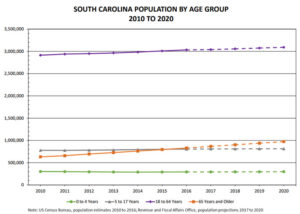 Michigan is typically seen as the exception, not the rule when it comes to tax breaks in seniors, Bruhl said.
Michigan is typically seen as the exception, not the rule when it comes to tax breaks in seniors, Bruhl said.
“Seniors are a very revered population and, politically, they vote,” Bruhl said. “Any state that has looked at trying to scale these back, it’s a very politically difficult decision.”
On Thursday, the S.C. House Tax Policy Review Committee unveiled a tax reform proposal to eliminate some sales tax exemptions in the state in favor of dropping the state sales tax from 6 percent to 3 percent, and eliminating the sliding scale of income tax and some of its exemptions from 3 percent to 7 percent to a flat 4.85 percent income tax
Also targeted in the reform is elimination of the Social Security Income Exemption, the $15,000 of income Age 65 and Over Exemption, the $3,000 Retirement Income Exemption for under Age 65) and the Military Retirement Exemption.
But the income exemption conversation is just getting started. Earlier this year, candidates for governor jockeyed for the limelight from retirees, with incumbent Gov. Henry McMaster and his GOP rival Lt. Gov. Kevin Bryant saying lowering taxes is key to helping retirees. Other Republican hopefuls Catherine Templeton and Yancey McGill floated expanding property tax exemptions on seniors.
McMaster has also said he wants to see law enforcement and military retirees pay zero state income tax.
For years, at least two legislators have pushed additional senior exemptions for property tax. S.C. Sen. Glenn Reese, D-Spartanburg, wants a homestead-like exemption on senior’s vehicles, up to $20,000 worth, and S.C. Rep. Kit Spires, R-Lexington, wants the homestead exemption to be expanded and include 100 percent of a home’s appraised value.
“We all as legislators want to do feel-good stuff and introduce things people like,” Reese said. “But you want a balance because somebody has got to pay a bill.”
Caps on property tax exemptions, like the one in Reese’s bill, is one way states can help lower-income retirees while also attracting and benefitting from wealthier retirees from out-of-state, according to Bruhl.
Spires also said his bill could be capped at $100,000 and utilize a residency restriction — all things that can come up in amendments if it ever gets debated. As is, his bill comes with a $100 million price tag as the state would have to pick up more of local school district expenses with the property tax loss.
“That’s the uphill battle I face,” Spires said. “Until our state can generate more money and more revenue, this legislation is not going to pass.”
Both men said the bills aren’t about winning votes, but complying with the wishes of their constituents.
Cobb said the state is already plenty attractive for out-of-state retirees and that the conversation needs to move beyond taxes. He said community programs that help seniors stay connected, obtain transportation and receive meals, and supporting caregivers are key elements to consider in the coming years. His group is also keeping tabs on the state’s soaring electricity rates and expanding nurse practitioners’ roles.
- Have a comment? Send to: brack@statehousereport.com
A look at “personhood” bill, new budget numbers, and tax reform
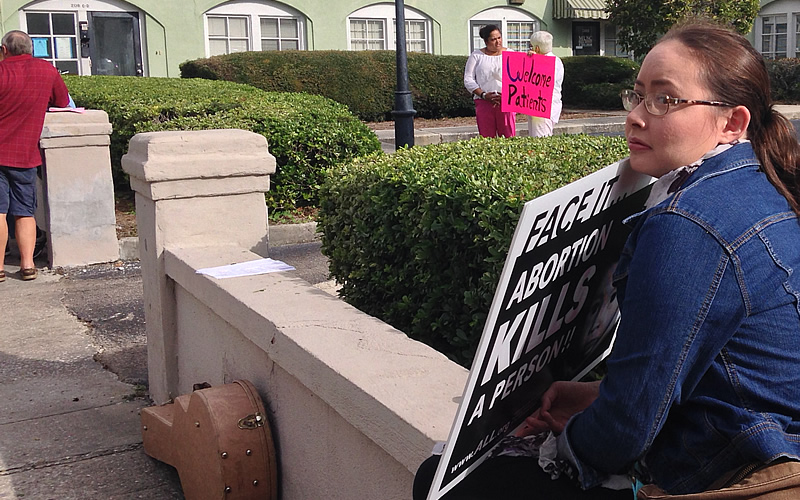
Floor battle over abortion bill may roil state Senate
Staff reports | Now that the S.C. Senate Judiciary Committee voted 12-9 Tuesday to forward a controversial anti-abortion bill to the Senate floor, sources predict little may get done for the rest of the session if the bill comes up for ongoing debate.
“If this bill is placed on special order, the only thing of consequence that will pass this year is the budget,” one insider observed.
The bill, S. 217, calls for approval of the “Personhood Act,” which would essentially end legal abortion in the state. It would seek to “establish that the right to life for each born and preborn human being vests at fertilization and that the rights of due process and equal protection, guaranteed by Article I, Section3 of the Constitution of this state, vest at fertilization for each born and preborn human being.”
Currently, the bill is on the state Senate’s contested calendar. As long as it is there, the Senate’s 18 Democrats, who uniformly opposed the measure, can vote as a bloc to keep it from active debate through parliamentary procedure.
But the Senate rules also allow for up to three bills to be put on “special order” to ensure debate. For the personhood bill to be put on special order, two-thirds of senators “present and voting” would have to agree to the procedure. Because South Carolina has 46 senators, that means the GOP would need at least 30 votes for special order. One GOP senator has been suspended and another, state Sen. Sandy Senn, R-Charleston, abstained Tuesday from the committee vote on the bill because of concerns about its constitutionality.
If Democrats remain united, they could thwart debate on the bill for the rest of the session.
But Senate rules allow for a way around the two-thirds threshold. According to Senate Rule 33B, the threshold to set a special order is a simple majority of the chamber if a majority of the Senate Rules Committee agrees it should be on special order. In that case, the bill would be at the top of the Senate agenda every legislative day and potentially grind all other work to a halt.
The Senate Rules Committee, chaired by Senate Majority Leader Shane Massey, R-Edgefield, includes 17 members, 8 of whom are Democrats.
Advocates opposed to the bill sent out alerts Tuesday asking people to sign petitions against the measure.
Vicki Ringer, director of public affairs, Planned Parenthood Votes! South Atlantic, described the proposal as “a bill that would ban all safe and legal abortion and threaten access to infertility treatment, miscarriage management, and many common and effective forms of birth control. … This extreme piece of legislation would require that South Carolina law give fertilized eggs the same legal rights and constitutional protections as all people in South Carolina. “
Gov. Henry McMaster, in a campaign message to supporters, urged South Carolinians to “help protect innocent life” and attacked Planned Parenthood: “Last year, more than 10,000 innocent babies were killed in the state of South Carolina because of groups like Planned Parenthood,” according to a campaign email.
— Andy Brack
House panel unveils first budget draft, looks at tax reform
Staff reports | The S.C. House Ways and Means Committee has released a spreadsheet outlining the state’s $8 billion spending plan, the first draft of what the House hopes to pass.
Another draft is expected on House member’s desks next week with the House going into budget deliberations by March 12. The budget will then go to the Senate and finally the governor. The budget year begins July 1.
The budget has been described as tight without much wiggle room, but House Ways and Means staff are including modest pay increases for the state’s public school teachers and some law enforcement officers. Public employees would not see an increase to their health care costs — the state is planning to pick up that increased tab.
— Lindsay Street
Lower sales tax, flat income tax floated in S.C. House
A House tax reform committee also released a proposal this week aimed at flattening taxes in the state.
The proposal seeks to eliminate some sales tax exemptions, like the one on groceries and medical services, in favor of dropping sales tax from 6 percent to 3 percent. Income tax would be one rate at 4.85 percent, instead of on a sliding scale of 3 percent to 7 percent.
The proposal does not deal with federal conformity of the tax code, however. According to previous coverage by Statehouse Report, if the state chooses to conform to the new federal tax overhaul, the state could inadvertently raise taxes on citizens without a corresponding tax code change.
— Lindsay Street
- Have a comment? Send to: feedback@statehousereport.com
Budget work moves forward, more
By Lindsay Street, Statehouse correspondent | Work on the state budget will consume much of what S.C. House members are talking about for next week, sources say. Members should get a draft of the budget next week, giving them a full week to review before it hits the floor. Here are a few other items coming up in the Senate:
- Chicken bill. The Senate has put on special order a bill that would limit legal challenges on chicken houses in the state. Right now in discussions, senators are tied up on agreeing on setbacks in the bill. According to Sen. Glenn Reese, D-Spartanburg, the debate now is about trying to put enough buffers around the foul-smelling fowl houses so complaints from nearby residents would be minimized.
- Children’s advocate. Next scheduled for Senate floor debate is a bill creating a children’s advocate in South Carolina, according to key sponsor Sen. Katrina Shealy, R-Lexington. Shealy called the bill “the most important piece of legislation this session.” It establishes a watchdog advocate over various child services offered by the state.
- Old Sparky. The Senate could allow the state to go retro on executing condemned prisoners. As lethal injection drugs have been harder to obtain, prisoners on death row have experienced a reprieve in the state. Now some lawmakers want to bring back the electric chair, nicknamed Old Sparky. There is also another bill the Senate is considering to shield drug makers from being known publicly as providing lethal injection drugs. These bills are getting in position to hit the Senate floor in the coming weeks, according to Senate sources.
- Nurse practitioners. A Senate bill to expand the territories and abilities of nurse practitioners in the state heads to the Senate Medical Affairs Committee next week. According to AARP of South Carolina spokesman Patrick Cobb, this piece of legislation will help seniors and others in the state with access to more affordable health care.
- Public input sought. The Legislative Oversight Committee meets 1 p.m., March 1, at room 110 of the Blatt building. The meeting will offer a chance for public input on the Department of Labor, Licensing, and Regulation; Department of Parks, Recreation, and Tourism; and Department of Revenue. Individuals can sign up to testify by calling the House Legislative Oversight Committee at 803-212-6810.
- Bullying. The House Education and Public Works Committee will consider a bill Tuesday that would provide procedures for responding to and remediating allegations of bullying in public schools. Click to see the agenda for the full committee meeting.
Looking back: From personhood to nuclear quagmire
- Personhood. The Senate bill that would effectively ban abortion in the state received a favorable vote in committee and advanced to the Senate floor this week. The bill would define human life as beginning at fertilization. For more, see our News Briefs.
- Base Load Review frozen. The Senate passed a bill that would stop the state’s utility commission from issuing orders from requests under the Base Load Review Act, which allows utilities to raise rates to pay for under-construction projects. The bill now heads to the House.
- Opioid education. The House passed a bill authorizing opioid addiction to be taught to high schoolers. The bill now heads to the Senate.
- Dyslexia screening. The House passed a bill requiring the S.C. Department of Education to regularly screen students for a reading disability. The bill now heads to the Senate.
- Mandatory child abuse reporters. The House passed a bill including religious counselors among the state’s mandatory reporters, who are duty-bound to report suspected child abuse or neglect to the state.
Flow of new bills ebbs in legislature
Staff reports | The flow of newly-introduced bills ebbed this week as senators introduced 25 bills and House members submitted 50 new bills, several of which dealt with safe schools. In typical legislative weeks, it’s not unheard of for more than 100 bills to be introduced. Key bills are summarized below.
IN THE SENATE
Greenville Health System. S. 1026 (Timmons) seeks to change governance, including starting a new nonprofit, for the Greenville Health System, with many provisions.
Retirement plan. S. 1028 (Bennett) seeks to close the S.C. Retirement System and establishing the “S.C. shared-risk defined benefit plan,” with many provisions. H. 5000 (Lucas) is similar. S. 1040 (Davis) is related in that it would require new state employees to participate in a defined contribution plan, with several provisions.
Orangeburg Massacre. S. 1029 (Jackson) seeks to establish a fact-finding study committee to review the Orangeburg Massacre and make a report.
Narcotics. S. 1046 (Bright Matthews) seeks to change state law to limit prescriptions of Schedule III controlled substances to seven days for a first prescription and to four days for subsequent prescriptions.
Orangeburg schools. S. 1047 (Hutto) seeks to consolidate the county’s schools into one district.
IN THE HOUSE
School resource officers. H. 4963 (King) seeks to require public school districts to have the continuous presence of school resource officers to boost safety. H. 5008 (Jefferson) seeks a measure to require each school to have one person to monitor school surveillance equipment, with several provisions.
Active-shooter drills. H. 4966 (Pendarvis) seeks to require monthly active shooter drills and training in public schools.
School protection officers. H. 4972 (Lowe) seeks to allow public schools and colleges to designate employees as armed “school protection officers,” with several provisions.
Assault rifles. H. 4975 (Brawley) seeks to ban assault weapons and high-capacity magazines, with several provisions. H. 4990 (Rutherford) seeks to prohibit sales of assault weapons to people under age 20.
Lieutenant governor. H. 4977 (G.M. Smith) seeks to establish a protocol to replace a lieutenant governor who resigns and how a gubernatorial candidate selects a running mate, with several provisions.
- Find all bills.
- Have a comment? Send to: feedback@statehousereport.com.
Electric bills, hate groups, Russian trolls, organs and wages
By Lindsay Street, Statehouse correspondent | Our weekly Top Five feature offers big stories or views from the past week or so with policy and legislative implications that you need to read because of how they could impact South Carolina. If you have stories to suggest to our readers, send to: feedback@statehousereport.com.
- S.C. residents pay highest electric bills in nation, The State, Feb. 16, 2018.
South Carolina’s need for heating and cooling — coupled with its reliance on electricity for those home comforts — have contributed to making its electric bills the highest in the nation, according to a report from the U.S. Energy Information Administration. At least one expert also fingered the failed nuclear expansion project shuttered last year, which has saddled ratepayers with $9 billion in debt. An excerpt:
“S.C. residents paid an average of $1,753 for electricity, about $400 more than the U.S. average, according to the U.S. Energy Information Administration. That’s almost twice as much as residents of New Mexico, the state with the lowest residential electricity costs, the report said.”
- Hate groups on the rise in South Carolina, The Post and Courier, Feb. 21, 2018.
An annual report from the Southern Poverty Law Center shows the number of hate groups in South Carolina has increased from 12 to 14. It’s the second year in a row the state has seen an increase in hate groups, and it’s mirroring a national trend. The state’s GOP chair countered the center’s claims that the uptick is due, in part, to rhetoric from President Donald Trump. An excerpt:
“Meanwhile, Ku Klux Klan chapters fell by nearly half, from 130 to 72. (Heidi Beirich, the law center’s Intelligence Project director) said this shows a new generation of white supremacists are rejecting the old-school ways of the Klan but embracing the alt-right’s ‘hipper rebranding’ of racist ideologies.”
- Russian trolls target South Carolina voters, analysis says, The Post and Courier, Feb. 21, 2018.
The Post and Courier analyzed Twitter accounts tweeting about the 2016 presidential election and the Emanuel AME Church shooting in 2015 and found that there were Twitter accounts connected to Russian trolls fueling division among South Carolina voters. An excerpt:
“Kremlin-backed Twitter accounts retweeted inflammatory comments from South Carolinians who favored Donald Trump and held anti-Muslim views. The trolls occasionally veered away from politics but still showed a knack for identifying local hot-button issues. One account tweeted about a carriage horse that had collapsed. The tweet included #BanHorseDrawnCarriageRides hashtag.”
- Organ donations increase in South Carolina, The Post and Courier, Feb. 19, 2018.
South Carolina is in the top five for organ donation in the country with more than half of South Carolinians registered as organ donors with the S.C. Department of Motor Vehicles. An excerpt:
“We Are Sharing Hope SC, an organ and tissue recovery service, announced recently that 560 organs were transplanted from South Carolina donors last year — the highest number in the group’s 33-year history.”
- South Carolina lacks minimum-wage investigators, Politico, Feb. 18, 2018.
South Carolina is one of six states without a dedicated team of wage investigators. That means workers cannot file minimum wage or overtime claims in the state — instead appealing to the U.S. Department of Labor. The federal department, however, only takes cases selectively, based in part on the number of employees involved and the extent of the wrongdoing. An excerpt:
“Politico … found that workers are so lightly protected that six states have no investigators to handle minimum-wage violations, while 26 additional states have fewer than 10 investigators. Given the widespread nature of wage theft and the dearth of resources to combat it, most cases go unreported. Thus, an estimated $15 billion in desperately needed income for workers with lowest wages goes instead into the pockets of shady bosses.”
- Have a comment? Send it to: feedback@statehousereport.com.
BRACK: Make our schools safer with real gun reform
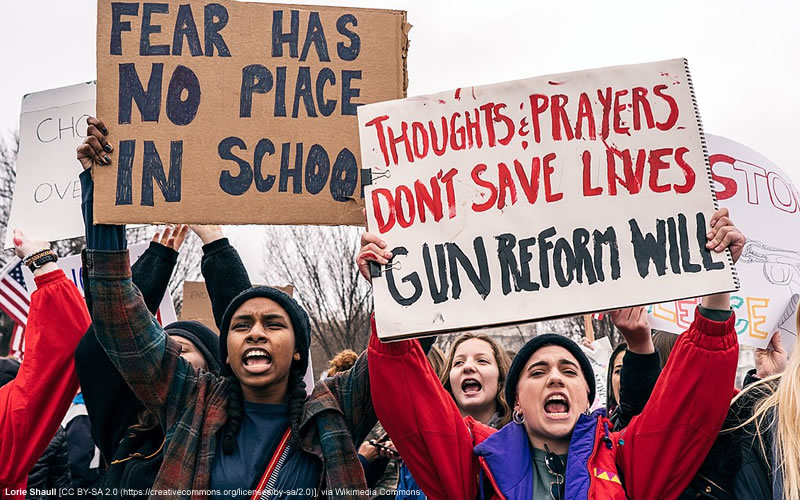
By Andy Brack, editor and publisher | This time, it feels like something about guns is going to happen. After the Parkland slaughter of 17 students and teachers, inaction doesn’t seem to be a viable automatic political reflex for mass gun violence.
Maybe the nation has reached a tipping point, thanks to thousands of Florida students who marched on the state’s capital to pressure lawmakers to make common-sense reforms to curb the gun violence.
“The times have clearly changed,” University of South Florida political science professor Susan MacManus told a Tallahassee newspaper. “And the activism of the students and their parents and grandparents and everyone else has made this a bigger issue and a much more politically impactful issue. I think it has ramifications for any partisan race from the top of the ticket down to local races.”
Never again, these students shout, reminding people of shootings that left too many people dead in places like Las Vegas last year, Orlando, Virginia Tech, Sandy Hook, Sutherland Springs, and, yes, Charleston.
During a White House listening session this week, an anguished father whose daughter died in Parkland captivated the nation with a simple question: “How many schools, how many children have to get shot?”
In South Carolina, little has been done at the Statehouse to curb gun violence since the 2015 massacre at Emanuel AME Church that took the lives of nine people, including the church’s pastor, state Sen. Clementa Pinckney.
But maybe inaction is changing. State Rep. Marvin Pendarvis, D-North Charleston, filed a bill Tuesday that would require monthly “active shooter” drills at South Carolina public schools. A bill authored last year by S.C. Sen. Sandy Senn, R-Charleston, would make it illegal to threaten violence against a school. It moved out of a Senate subcommittee Thursday. Other measures call for metal detectors or schools or all-out bans on assault weapons.
“If Congress refuses to do something, then we have to do something on the state level,” said Pendarvis, a freshman legislator. “We have no choice. … The conversation has got to be had. I believe we’ve reached that tipping point.”
It’s encouraging President Trump is now supporting the ban of bump stocks that convert rifles into machine guns. But another idea he floated – to arm teachers in schools – is not the solution America needs, particularly when bullets cost more than the pencils that teachers often pay for with their own money. The solution is not to arm teachers if you note the example of the armed Parkland officer who found a safe place and did nothing as 17 students and teachers died.
According to a 2017 report by the Pew Research Center, people across the nation – Republicans and Democrats – want something done about gun violence. More than 90 percent say gun violence is a very big or moderately big problem, including 74 percent of gun owners. Furthermore, 86 percent of Americans say the ease of getting illegal guns contributes a great deal to gun violence, while 60 percent say the ease of getting legal guns contributes a lot to gun violence.
There is a plethora of policy proposals nationally that people strongly or somewhat favor to thwart gun violence, including keeping people with mental illness from buying guns (89 percent in favor); requiring background checks at gun shows and at private sales (84 percent); banning assault-style weapons (68 percent) and banning high-capacity magazines that hold more than 10 rounds (65 percent). The data also show about half of Americans strongly or somewhat favor allowing people to carry concealed weapons in more places (46 percent) and letting teachers and school officials carry guns (45 percent).
Keeping South Carolina schools safe is a huge priority, said Ryan Brown, spokesman for the S.C. Department of Education. Currently, state law requires school districts to have a safe school plan. The state office offers a long checklist of best practices for schools to follow and favors active shooter drills, Brown said. About three-fourths of districts around the state have periodic drills.
“At some point in time, we are going to see some changes,” Brown observed.
For now, though, students and teachers need to remain vigilant and report anything scary that they see or hear. Let’s hope something more can be done at the Statehouse so another Parkland doesn’t happen.
- Have a comment? Send it to: feedback@statehousereport.com.
Francis Marion University
 The public spiritedness of our underwriters allows us to bring Statehouse Report to you at no cost. We’re happy this week to shine a spotlight on Francis Marion University, a public university located in Florence, S.C. It was founded in 1970 with a mission to provide the people of the Pee Dee, and of South Carolina, with high quality, yet accessible, university education. FMU has stayed true to that mission for nearly 50 years. In any given year, more than 95 percent of the university’s students are South Carolinians, and FMU is, by most measures, the most affordable college in the state.
The public spiritedness of our underwriters allows us to bring Statehouse Report to you at no cost. We’re happy this week to shine a spotlight on Francis Marion University, a public university located in Florence, S.C. It was founded in 1970 with a mission to provide the people of the Pee Dee, and of South Carolina, with high quality, yet accessible, university education. FMU has stayed true to that mission for nearly 50 years. In any given year, more than 95 percent of the university’s students are South Carolinians, and FMU is, by most measures, the most affordable college in the state.
FMU prides itself on providing a strong liberal arts education for its 4,000 students, while at the same preparing them for careers in a broad range of fields. The university offers professional schools in health care, education and business, as well as graduate programs in business, education and psychology. FMU’s new School of Health Sciences is adding new programs, designed to help deliver critical medical services to the community, on an almost annual basis, so great is the demand by students and the need in our region and state. Recent undergraduate additions to the University as a whole include Health Care Management and Industrial Engineering. The latter, just begin in 2014, is already one of the fastest-growing majors on campus.
The campus is situated on over 400 wooded acres of beautiful foliage and landscaping. A significant campus presence in historic downtown Florence is also developing. FMU’s Performing Arts Center is located there along with the Carter Center for Health Sciences, and the FMU Recording Studio, The University recently acquired more downtown property near the Carter Center, which will help support future academic expansions. FMU has managed this unusual balance of quality and affordability by avoiding capital debt, minding administrative costs carefully, and developing a culture of giving among its many friends and supporters in the Pee Dee and beyond.
- To learn more about Francis Marion, visit online atfmarion.edu.
Bruce: Black Voters Matter kicks off South Carolina initiative

By Catherine Fleming Bruce, special to Statehouse Report | Following last year’s stunning electoral victory of Democratic candidate Doug Jones in Alabama, led by black women, South Carolina organizers with Black Voters Matter have committed to a similar outcome in 2018.
Black Voters Matter has pledged to collectively build black power in the South for the long run, leading to electoral victories. The Black Voters Matter South Carolina Initiative launched its 2018 effort with a Black Love and Political Power Palmetto State tour, held Feb. 11 to Feb. 14.
The tour was a first step in hearing from black people and black organizations working on the ground in citizen engagement, electoral politics, health, voter registration and community development. It was organized by Tnovsa Global Commons, a charitable organization in South Carolina which trained leaders in over 16 counties through the Just Democrats initiative. Its emphasis is not on *votes* but on *voters*, and on their improved quality of life.
Black Voters Matter, the organization that worked side by side with black Alabamans to topple Roy Moore and bring the Doug Jones win, was co-founded by strategists LaTosha Brown and Cliff Albright in 2016. It is a nonpartisan effort committed to strengthening networks that will lead to political victory in 2018 and social change beyond.
Brown and Albright, at the invitation of Tnovsa Global Commons, led S.C. listening sessions with participants against the backdrop of the new Orangeburg Massacre exhibit at S.C. State University’s I.P. Stanback Museum; in Columbia at Second Calvary Baptist Church, home of the charitable foundation named for NAACP leader James M. Hinton; at the Mary McLeod Bethune Park, operated by the Lee County National Council of Negro Women in Mayesville; the C. Williams Rush Gallery/Museum of African-American History and Culture in Kingstree; the Ronald E. McNair Life History Center in Lake City; and the ‘Friendship Nine’ McCrory Five and Dime in Rock Hill.
Close to 100 participants, including students, current and former elected officials, political party leaders, health care workers, community activists and organizers, religious leaders, established statewide entities and new resistance groups joined in the discussions. Feedback from the tour demonstrated a strong appetite for building black capacity for political engagement, a sense of urgency to engage for the upcoming primary and general election races, and fighting for long term as well as short term electoral victories.
In addition to these stops, the Palmetto tour visited Greenville, Winnsboro, Florence and Cheraw. The opening Sunday evening event in Charleston County was dedicated to carrying on the freedom dream of Muhiyidin Moye, the Charleston-based racial justice activist murdered on Feb. 6 in New Orleans.
Over the next few weeks, the Initiative will reach out to additional organizations and counties in South Carolina with large black populations. The Black Voters Matter South Carolina Initiative is also committed to supporting an end to police, gun and domestic violence.
The Black Voters Matter South Carolina Initiative plans to be a support that maximizes cooperation between existing groups, increasing long term the number of black people who are politically engaged and working together across class/age/gender and other divides to win elections, impact policy and improve social and economic conditions. The group will also focus on:
1) The critical need to protect democratic institutions and values that are being systematically destroyed by the current White House administration;
2) The need to engage black and brown South Carolinians in successful strategies to address poverty and economic inequality, to provide economic opportunity and full engagement and inclusion in an American society that is free of racism and bigotry;
3) The need to build a permanent statewide force of black and brown South Carolinians (black, Hispanic and native Americans) who vote, and are civically engaged for electoral wins in 2018 and beyond;
4) The need to bridge the ‘progressive – establishment’ divides in order to win elections together in 2018 and beyond; and
5) The need to combine electoral action with grassroots and movement politics to change the balance of power in D.C. and S.C.
Catherine Fleming Bruce is author of the award-winning book, The Sustainers: Being Building and Doing Good through Activism in the Sacred Spaces of Civil Rights, Human Rights and Social Movement and director of the Black Voters Matter South Carolina Initiative. She can be reached by email at tnovsacfb@gmail.com.
- Have a comment? Send it to: feedback@statehousereport.com.
Take a stand and send us your thoughts
We encourage your input to Statehouse Report. If you have a view on a policy issue or political subject, you can submit a short Letter to the Editor or a more in-depth commentary or “op-ed” piece through our new My Turn section.
Here are the guidelines for submitting material to Statehouse Report:
- Letters to the Editor: Letters to the editor are published weekly. We reserve the right to edit for length and clarity. We generally publish all comments about South Carolina politics or policy issues, unless they are libelous or unnecessarily inflammatory. One submission is allowed per month. Submission of a comment grants permission to us to reprint. Comments are limited to 250 words or less.
- My Turn op-eds. If you have a significant policy subject that would want to pursue in a lengthier forum, we accept unsolicited commentaries of 600 words or less. As above, we reserve the right to publish based on editorial standards. We will notify you within a week about whether we’re interested in your submission.
- Have something to say? Send 200 words or less to feedback@statehousereport.com
Ornate building
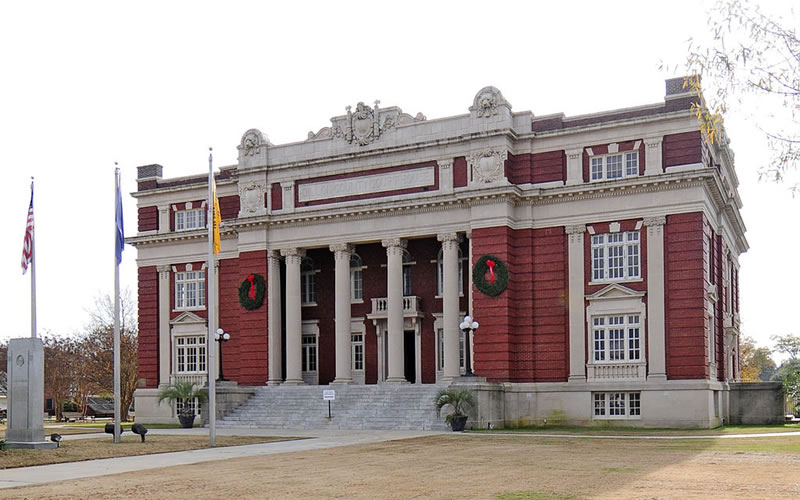
So here’s an ornate Italian-looking building that landed somewhere in South Carolina. Send your best guess – plus your name and hometown – to feedback@statehousereport.com. In the subject line, write: “Mystery Photo guess.”
Last week’s mystery
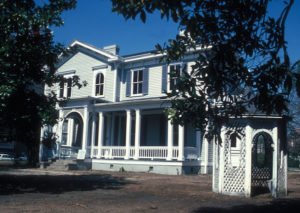 Jay Altman of Columbia, and George Graf of Palmyra, Va., were the only two readers to correctly guess that last week’s photo was the boyhood home in Columbia for U.S. President Woodrow Wilson.
Jay Altman of Columbia, and George Graf of Palmyra, Va., were the only two readers to correctly guess that last week’s photo was the boyhood home in Columbia for U.S. President Woodrow Wilson.
Graf told us he always thought Wilson was born and bred in Staunton, Va.
“Never knew he lived in South Carolina or was the Governor of New Jersey,” Graf wrote. “His father, Joseph Wilson, owned slaves, defended slavery, and also set up a Sunday school for his slaves. Both parents identified with the Confederacy during the American Civil War. During Reconstruction, Wilson lived in Columbia, S.C., from 1870 to 1874, while his father was a theology professor at the Columbia Theological Seminary.
Couple of my favorite quote attributed to President Wilson:
- “The way to stop financial joy-riding is to arrest the chauffeur, not the automobile.” — The Atlanta Constitution (14 January 1914)
- “I not only use all the brains I have, but all I can borrow, and I have borrowed a lot since I read it to you first.” — Speech to the National Press Club (20 March 1914)
Send us a mystery: If you have a photo that you believe will stump readers, send it along (but make sure to tell us what it is because it may stump us too!) Send to: feedback@statehousereport.com and mark it as a photo submission. Thanks.
S.C. ENCYCLOPEDIABenedict College
A historically black college in Columbia, Benedict College was founded in 1870 on the site of an eighty-acre plantation. Rhode Island native Bathsheba Benedict, serving with the Baptist Home Mission Society, purchased the property with the long-term goal of educating recently emancipated African Americans.
Originally named Benedict Institute, the school began with a class of ten men, one building (a dilapidated former slave master’s house), and one teacher, the Reverend Timothy L. Dodge, a college-educated northern minister who would become the school’s first president. These first students followed a curriculum of grammar school subjects, Bible study, and theology. Later, additional courses were added to train Benedict’s students for work as teachers and ministers.
In 1894 the school was chartered by the General Assembly as a liberal arts college and became Benedict College. During the next three and a half decades, the college continued to be led by white northern clergymen. In 1930, however, the first African American president was appointed. The Reverend John J. Starks, an 1891 graduate of Benedict, began a succession of African American leaders of the college.
Throughout the twentieth century, Benedict College expanded its campus, its curriculum, its student body, and its significance to the Columbia region and beyond. Scholars such as Benjamin Mays and Benjamin Payton helped to bring national attention to Benedict, as did the achievements of its alumni, which included the civil rights activists Septima Clark and Modjeska Simkins. During the 1990s, the section of the campus at the corner of Harden and Taylor Streets in downtown Columbia underwent substantial renovations to all of its historic sites, dormitories, and administration buildings. Also in the 1990s, football returned to Benedict after a twenty-nine-year hiatus. Shortly thereafter, Benedict and South Carolina State University briefly rekindled their football rivalry in the Palmetto Capital City Classic until South Carolina State pulled out in 2004.
By the end of the twentieth century, under the leadership of Dr. David Swinton, Benedict College saw its enrollment grow to nearly three thousand students, making it, in terms of enrollment, one of the largest historically black colleges in the Carolinas and one of the largest private colleges in South Carolina. In 2003 the college broke ground on its multimillion-dollar, sixty-one-acre LeRoy Walker Athletic and Wellness Complex (named after Olympic president emeritus Dr. LeRoy T. Walker, alumnus of the class of 1940). The college planned the complex not only to serve the fitness needs of students and faculty, but also to house the stadium of the Benedict Tigers football team. In 2004 Benedict began developing graduate courses in business and religion to complement its bachelor’s degree offerings in twenty-nine areas.
— Excerpted from an entry Stephen Criswell. To read more about this or 2,000 other entries about South Carolina, check out The South Carolina Encyclopedia, published in 2006 by USC Press. (Information used by permission.)















 We Can Do Better, South Carolina!
We Can Do Better, South Carolina!